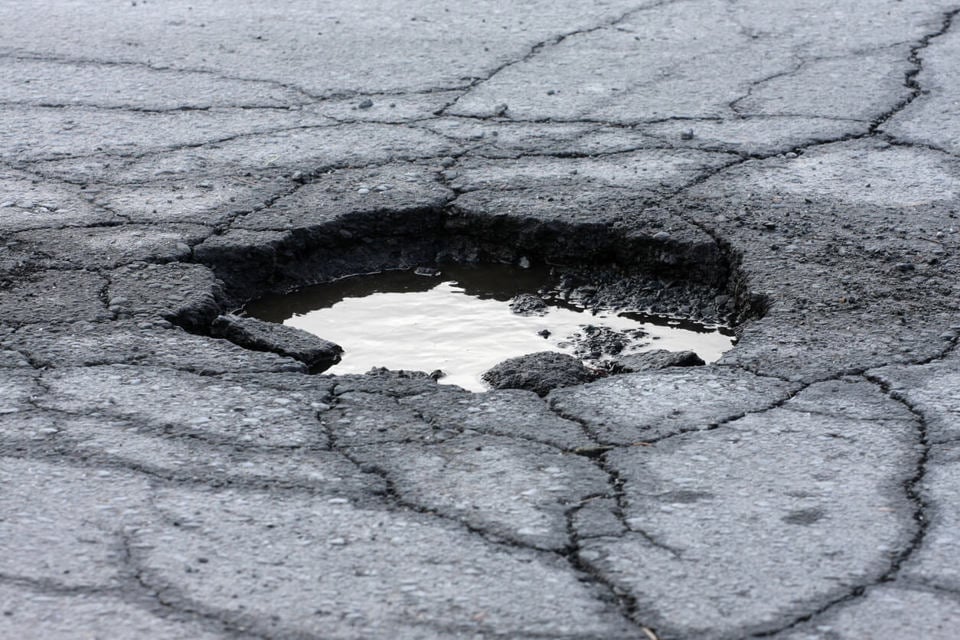Figures from the OECD – a group of 38 high income countries – show that £4 billion was spent in 2006 on UK local road maintenance compared with £2bn in 2019 - the last year of comparable data available.
This is compared to Sweden, Denmark, the United States, Japan and New Zealand which have increased spending by around half over the same period.
Countries including France, Finland and Canada have also protected pothole repair budgets more than the UK Government has.
Only Italy and Ireland have seen such similar drops in spending on local roads.
The Local Government Association (LGA), which represents councils across England and Wales, said it wants to work with Government on a devolved, long-term plan for our local roads, which needs to include greater and more consistent funding to get investment in roads back up to the levels of other leading countries.
The Government currently spends 31 times more per mile on maintaining motorways than local roads.
Ahead of the next General Election, the LGA is calling on all political parties to pledge to a 10-year programme where current funding for local roads and local transport infrastructure is boosted by devolving the equivalent of 2p of existing fuel duty.
This, it says, would help councils to reverse the current decline in road conditions.
Despite additional funding delivered in the Budget this year, latest estimates from the Annual Local Authority Road Maintenance (ALARM) survey found that councils face a record £14bn road repair backlog which it would take them 11 years to tackle without further support.
Rising levels of inflation which has pushed up the cost of materials such as bitumen as well as more extreme winter weather has made it harder for councils to tackle potholes and maintain local roads.
Cllr Shaun Davies, chair of the LGA said: “The UK has fallen from the top to almost the bottom of the league when it comes to the amount we spend on repairing our local roads.
“Decades of reductions in funding from central government to local road repair budgets has left councils facing the biggest ever annual pothole repair backlog.
“Positive extra funding in the recent Budget will help, but councils still face considerable challenges when trying to get on top of this pothole blight.
“In order to support motorists, the Government should take this opportunity to work with councils to develop a long-term, fully-funded programme to catch up with the backlog.
“Ultimately, all local transport decisions should be devolved to councils, who are best placed in determining what is a priority for their areas.
“This will allow councils not just to tackle potholes but make improvements to road surfaces, saving money in the long term and improving our roads for everyone who uses them.
“As well as this, we would urge all parties to commit to invest in our local road network at the next general election, which is so important to our residents and our business community.”
AIA chair Rick Green says that it is “no surprise” that the LGA analysis has found UK highway maintenance budgets at the low end of the OECD scale.
“The picture of managed decline reflects the findings of our Annual Local Authority Road Maintenance survey, which has reported for many years on local highways budgets under pressure and the resulting impact on road conditions,” explained Green.
“The link between continued underinvestment and the ongoing structural decline and below-par surface conditions of our local roads is clear.”
He added: “We support the LGAs call for committed investment in local roads and a longer-term approach.
“The AIA also believes that more local highway budget ringfencing is needed to ensure that funds are directed to the type of works that deliver the best value for money, lower lifetime carbon impacts as well as enhancing conditions and improving the resilience of the local road network.”
|
Transport infrastructure investment and maintenance spending |
||||
|
Country |
2006 |
2011 |
2016 |
2019 |
|
New Zealand |
100% |
142% |
137% |
178% |
|
Japan |
100% |
101% |
118% |
154% |
|
United States |
100% |
114% |
137% |
152% |
|
Austria |
100% |
100% |
141% |
152% |
|
Korea |
100% |
108% |
116% |
151% |
|
Sweden |
100% |
103% |
143% |
141% |
|
Switzerland |
100% |
114% |
122% |
121% |
|
France |
100% |
123% |
109% |
104% |
|
Canada |
100% |
104% |
93% |
85% |
|
Finland |
100% |
108% |
89% |
81% |
|
United Kingdom |
100% |
75% |
51% |
51% |
|
Italy |
100% |
46% |
63% |
51% |
|
Ireland |
100% |
90% |
47% |
43% |





















Login to comment
Comments
No comments have been made yet.